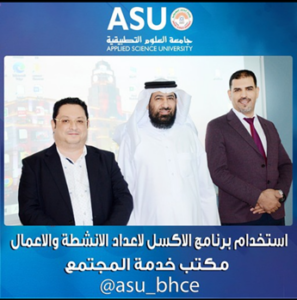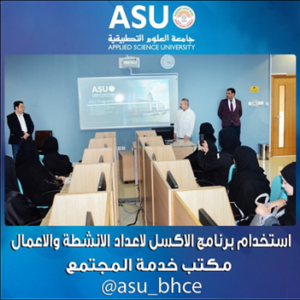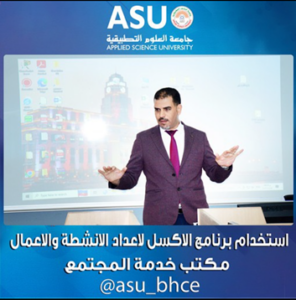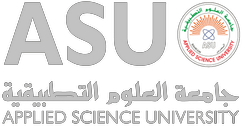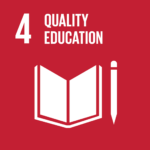Library and Information Service
https://www.asu.edu.bh/library-and-information-services/directors-message/
The Library of Applied Science University was established along with the inauguration of the University in 2004. The University has paid special attention to its library by providing it with an adequate budget to enrich its collections of books, periodicals and electronic materials in all knowledge fields and by adopting the modern technology and the use of information technology.
The strategic plan of the ASU Library for 2020 – 2025 includes the vision of becoming distinguished in terms of resources and services and of being the main source of cultural and scientific knowledge and thoughts at the national and regional levels.
The Library of Applied Science University offers its services to the university community including the students, the faculty members and the administrative staff, in addition to the researchers from outside the university and from other Universities in Bahrain.
The Library also has publication exchange and philanthropic relations with many universities and different academic, cultural and scientific institutions.
The library has used computers in all its services and activities. In addition, it has purchased and operated a new library system called Future Library System that has been installed since 2010. The library offers the service of databases and online search on its portal lib.asu.edu.bh that also contains all the provided services in Arabic and English. The home page includes all the information about the library.
The Library also provides 10 private research rooms for the community of the university.
The library collection includes more than 32000 books and 38 English and Arabic paper journals that cover all fields of knowledge. Moreover, the library has an annual subscription to e-books and has the access to databases including electronic journals …in full text. The Library subscriptions include the following databases:
ProQuest: Architectural Periodicals which offer a comprehensive listing of journal articles published worldwide.
Ebook: Includes books of all scientific and humanities subjects.
ARADO: Publications of the Arab Administration Development.
EMERALD: Includes a wide collection of journals, books and case studies.
EBSCO: Includes a collection of books, journals and research databases.
ACM: One of the most important digital libraries in information technology and computer science.
The Learn Book: Includes books and references in all fields.
Dar AlMandumah: It contains around 60000 PhD and master’s thesis in all academic disciplines, especially social sciences.
Science Direct (Scopus): Scopus uniquely combines a comprehensive, expertly curated abstract and citation database with enriched data and linked scholarly literature across a wide variety of disciplines.
Material ConneXion: World-class materials, library and consultancy and a resource for furniture and architectural design.
LexisNexis: Provides unparalleled legal and business information with analytics and technology.
TurnItIn: A software used for plagiarism check of students’ research and theses.
Library of Applied Science University offers many services such as photocopying, printing and circulation service. service. There are many seats available for studying and it opens from Sunday to Thursday from 8:00 am to 8:00 pm and on Saturday from 8:00 am to 5:00 pm.
Vision
Developing a leading Library Service, with world class resources, and deliver a professional service for all our communities, helping library users to build their future success at the heart of ASU.
Mission
To provide high quality resources and responsive services that contribute substantially to research, teaching and learning directions. ASU’s Library is dedicated to develop innovative, trusted and accessible services, collections and both printed and electronic resources in pursuit of the ASU’s mission.
Objectives
- Develop Library Collections
- Improve the User Experience
- Enhance Learning Opportunities
- Support Research Activities
- Maximize Engagement and Outreach
- Build Operations and Infrastructure
BOOKS & PUBLICATIONS
https://www.asu.edu.bh/library-and-information-services/books-publications/
Political Science
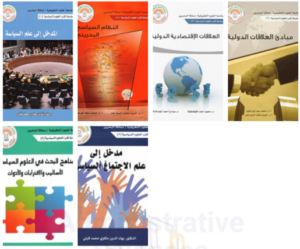
Administrative Science
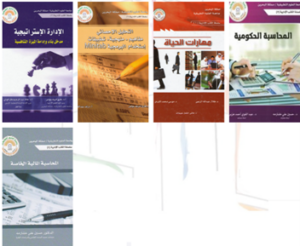
Law
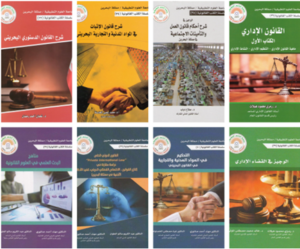
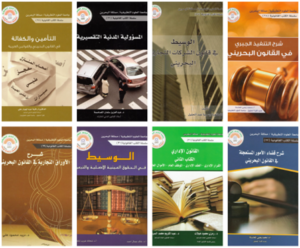
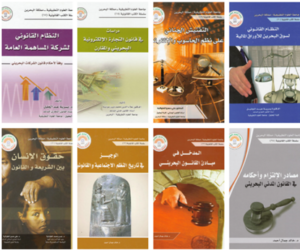
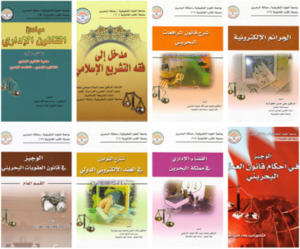
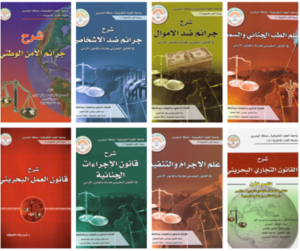
Arts
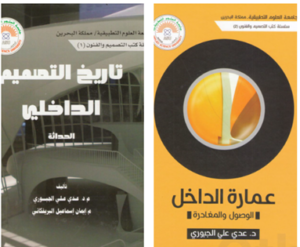
Library
https://www.asu.edu.bh/wp-content/uploads/2021/11/Student-Handbook-English-2022-2021.pdf
The Applied Science University (ASU) Library is both a physical and virtual centre where students and faculty engage in learning, teaching, and research. The Library serves the learning community with services to help both students and faculty with the information services and resources to maintain and acquire relevant and up to date knowledge and skills and find, assess and use information effectively and ethically.
The Library is conveniently located in the campus,spread over an area of 1000 squaremeters, consisting of a reading area, book display area, service counter, and 30 computer terminals including 10 study rooms, each equipped with a computer. The Library’s extensive collection includes over 32000 books in Arabic and English, printed journals that cover all subjects taught at ASU in business, computer science, political sciences, law, accounting and other fields, together with student theses. Library users can search physical library resources on and off campus using future library system. Currently, the Library receives more than 1,500 books to its collection annually. The required information materials are being purchased especially on recommendations of academic staff and students.
The University Library has Permanent Reference Collection (PRC) which consists of ready reference sources such as dictionaries, encyclopedias, government Gazettes, books in heavy demand. The Library and Information Services Directorate also operates a separate book shop for selling textbooks for the students. Further, the Library attends 2-3 book fairs per annum to facilitate the selection of additional academic and research material to be acquired for the Library.
The Library also has an annual subscription to e-books and access to databases including electronic journals in full text. ASU has extent its International databases and subscriptions and these now include ProQuest (Avery Index), Ebrary, ARADO, EMERALD, EBSCOhost, ACM Digital Library, The Learn Book and Dar Almanduma. Library users can access the databases and conduct online searches from on and off campus using library portal powered by Deep Knowledge via ASU’s website (lib.asu.edu.bh).
The Library is committed to creating information and technology-rich learning environment where academic and intellectual needs of our students and faculty members are anticipated, supported and fulfilled.
The Library endeavours to provide up to date, high quality and comprehensive educational and research material to students and faculty. It coordinates with the Deans and faculty to enable students to acquire and develop information literacy skills which support them in achieving academic excellence.
Main Services the Library and Information Services Directorate
- Guide students and help them find the desired material.
- Organise the borrowing operations by assigning a unique username and code to each borrower at the library system.
- Assist user(s) to ensure proper use of the library system.
- Help library attendants in printing, copying and bookbinding of study material.
- Manage the procurement of library resource(s).
- Check the reading list periodically to determine which items are likely to be in high demand.
- Organise informative workshops for students and staff.
- Operate the University book shop.
Every student is issued a library access along with a unique log-in credentials to access the E-library. The students are provided with information regarding the library system upon library registration. Students must produce their library access in order to borrow material from the library.

Photocopying Service
Printing and photocopying services are available for students at an advertised concessional rate.
General Library Rules
- If the discipline of the Library is violated by the students, the Librarian has the right to ask the students to leave.
- It is not permitted to photocopy more than 10% of the material regarding to the copyright regulations.
- At the time of leaving the Library, the visitors in possession of books and other library materials should leave it at the Library entrance.
- If the behaviour of the visitor offended someone or violates the instructions of the Library, then the DOL can prevent him/ her from entering the Library and disallow him/ her from borrowing any library materials for a period of one semester.
- Mobile phone should be turned off or kept on silent mode.
- Keeping the Library clean by not littering and following the Library rules and regulations is a must.
- Library property has to be respected and maintained at all times.
- Silence is a necessity inside the Library, and reasonable effort should be made to keep the noise level at a minimum.
- Students must show their ID cards when asked by the Librarian.
- Books that have been read or removed from their shelves can be left on the table.
- Library computers have to be used for academic purposes only.
- It is not allowed to leave any notes, scribbles or markings on the books or deteriorate/damage the books.
- Eating and drinking inside the Library is not permitted.
- Books can only be borrowed via the library card.
- It is not permitted to bring children inside the Library as this might distract the researchers from doing their work.
Library Opening Hours
- Saturdays to Thursdays from 8:00 a.m. to 8:00 p.m.
- Fridays from 2:00 p.m. to 8:00 p.m.
Electronic Library of ASU
Library Objectives
1 – provide sources of human knowledge to serve the various scientific disciplines at the university.
2 – systems development office in line with recent developments in the field of library and information services .
3 – Provide information services and office to facilitate search and retrieval through to the decisions of publications , catalogs, Guides, Scouts , and other.
4 – the exchange of publications and university publications deanship with universities and scientific institutions at home and abroad .
5 – Preparation of induction programs for students and faculty members the services provided by and how to use available sources of information .
6 – provide services to beneficiaries through the replies and queries and the delivery of the request as soon as possible
7 – creating the right climate inside the library for study and research.
8 – to encourage and support scientific research between students and faculty members.
9 – Encourage Scientific Publications ( research and studies , books, etc.) .
10 – Contribute to the construction of the intellectual community
Library users
- Students at various levels and specialties
2.Academic Staff
3. Administrative staff
4. Researchers in various fields and topics
5. members of the community
Rules of use of the library
Please
1. consider the advertised working hours
2. Mobile phones must be closed inside the library.
3. maintain order and cleanliness in the library.
4. maintain the library materials.
5. Keep quiet throughout the library.
6. leave the books after using on the table.
7. use computers in the library for research purposes only.
8. Prevent damage and add notes to books and other materials.
9. Don’t eat or drink inside the library.
10. Prevent borrowing unless you have an account on our website.
11. Don’t violate the library system, otherwise it’s allowed for the librarian to ask you to leave the library.
12. The library specialist is always at your service, please cooperate with him to provide better services.
Holding Search
https://library.asu.edu.bh/asu6.0/Libraries/start.aspx?fn=SearchInterFace&ScopeID=1.102.
Search on the page is available to all as shown below:
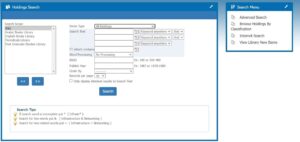
In addition to the global search which includes libraries of different international universities from all over the world. This search also is available to all and free charged.
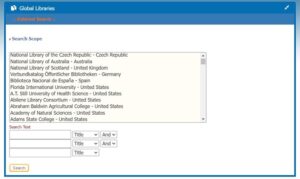
ASU E-Learning for All
https://www.asu.edu.bh/e-learning/
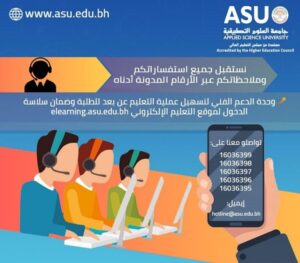
ASU promotes learning for all and has the purpose of teaching different topics, in this sense, through E-LEARNING it provides the students, staff and community in general with different courses, training free of charged in order to train and develop skills, to access the platform. The person must register with their basic data and can access different content.
ASU, thinking of the general community, students and staff, implemented an E-Learning section in which people who are part of the academic community and people outside the university can train and develop skills necessary for educational and human growth. ASU E-learning offers courses and training programs.
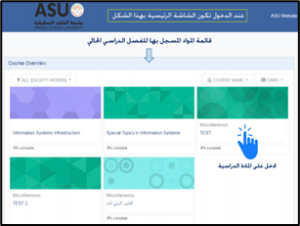
The courses offered by ASU are mostly for everyone, except for courses only for students, the others can be taken. This service is free of charged.
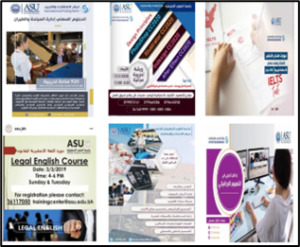
In the E-LEARNING Platform, grades are obtained through the TESTs that are presented on the course that is being developed and depending on the grade of the test the student passes or not.
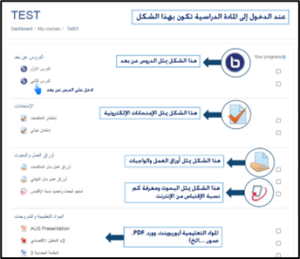
E-Learning Policy
https://www.asu.edu.bh/wp-content/uploads/2021/11/Student-Handbook-English-2022-2021.pdf
The University has developed the e-learning policy and procedure in compliance with its e-learning strategy and in line with its vision, mission and its strategic objectives in providing a quality e-learning system which includes technology enhanced learning and or online synchronous education.
The e-learning policy has been developed considering the e-learning strategic key priorities, including; building institutional capacity and the infrastructure to support the e-learning platform in enhancing the quality of students’ experience and opportunities, creating staff capacity capable to deliver online learning and teaching and supporting various students’ learning modes and needs.
This policy has been developed to ensure that online teaching, learning and assessment are well supported, effective and comparable to the face to face environment.
Learning Resources and Student Support
Course Material Academic departments shall ensure:
- Students have access to information on the programme, the course and components of study through the university website and the LMS.
- Students have access to the course specification through the LMS. The course specification should have clear intended learning outcomes, assessment methods, and quality learning and teaching material, and the schedule for the delivery of the coursework and assessments.
- Every student has a nominated academic advisor who supports them and provides guidance on their performance and progression through the student advising system.
- Students are provided with a schedule of student support, training activities, e.g. tutorials, guidelines on LMS tutorials, library resources, and basic trouble shooting skills.
- Students are provided with an e-learning course orientation at the start of their study at ASU with an overview of the university requirements, college requirements, department requirements, and course requirements.
- Students have access to academic staff through online office hours or by appointment on the LMS.
The University shall provide the following electronic services to all students:
- Academic advising system
- Electronic admission and registration
- Applications for financial aid
- Student appeal procedure
- Withdrawal process (Classes or college)
- Disciplinary committees
- Library/ learning resources
- Bookstore
- Technical assistance
- Career and Alumni Services Office
- Student Counseling Office
- Clearance applications
- Fees payment
- Certificate delivery
- English placement tests
Students with Special Needs
Students with special needs will be introduced to software features such as Magnifier, Narrator, etc. through induction at the beginning of the semester by the Deanship of Student Affairs. Feedback of students with special needs is received through SOS and processed by the Deanship of Student Affairs to make necessary arrangements with colleges.
Strategies” to the Local Community
https://www.asu.edu.bh/wp-content/uploads/2023/05/CE-Booklet2020-2021.pdf
Dr Ali El-Dada, Head of the Political Science Department at the College of Administrative Sciences, delivered an online lecture titled “E-Learning – Concept and Strategies” on May 27th, 2021, to the local community within ASU community engagement activities, the Training, Development and Continuing Education Centre and ASU Community Engagement Office. The lecture addressed various topics, including the e-learning concept, features, tools, and challenges, and face-to-face learning. In addition to the local community, the lecture attendance included a number of academic and administrative staff, ASU students and alumni.
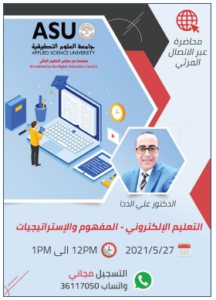
Delivering a Lecture Titled “Computer Application in Business” to the Local Community
https://www.asu.edu.bh/wp-content/uploads/2023/05/CE-Booklet2020-2021.pdf
Dr Ahmad Shatat, Head of Department of Management Information Systems at the College of Administrative Sciences, delivered an online lecture titled “Computer Application in Business” on June 23rd, 2021, to the local community within ASU Community Engagement activities, the Training, Development and Continuing Education Centre and ASU Community Engagement Office. The lecture addressed various topics, including Microsoft Office definition and its applications and practical examples of using applications, such as Word and Excel. In addition to the local community, the lecture attendance included a number of academic and administrative staff, ASU students and alumni.
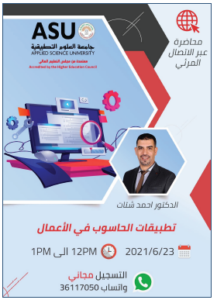
Delivering a Lecture Titled “Credit Cards Standards” to the Local Community
https://www.asu.edu.bh/wp-content/uploads/2023/05/CE-Booklet2020-2021.pdf
Dr Bishr Muhammad, Associate Professor in Department of Accounting and Finance at the College of Administrative Sciences, delivered an online lecture titled “Credit Cards Standards” on December 10th, 2020, to the local community within ASU community engagement activities, the Training, Development and Continuing Education Centre and ASU Community Engagement Office. The lecturer discussed a number of topics during the lecture, including the idea of the bank card, the idea of the credit card, the terms and method of issuance of these cards, the services provided by some banks to the holder of these cards, the way to deal with the credit card in travel, and economic tips to rationalise the use of credit cards. In addition to the local community, the lecture attendance included a number of academic and administrative staff, ASU students and alumni.
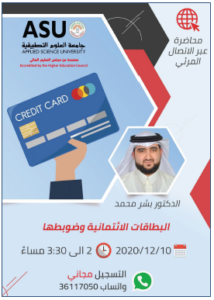
Delivering a Lecture Titled “The Art of Decision-Making and Solving Administrative Problems” to the Local Community
https://www.asu.edu.bh/wp-content/uploads/2023/05/CE-Booklet2020-2021.pdf
Dr Atheelah Alazawi, Assistant Professor in Department of Business Administration at the College of Administrative Sciences, delivered an online lecture titled “The Art of DecisionMaking and Solving Administrative Problems” to the local community on January 6th, 2021, within ASU community engagement activities, the Training, Development and Continuing Education Centre and the ASU Community Engagement Office. The lecture discussed a number of topics, including the concept of administrative decisionmaking, stages of decisionmaking, the manager’s role and data in decision-making, types of decisions according to the degree of data assurance, the role of computers in decision-making, and the role of quantitative decisionmaking methods. In addition to the local community, the lecture attendance included a number of academic and administrative staff, ASU students and alumni.
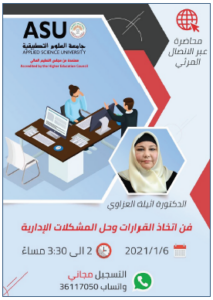
Delivering a Lecture Titled “3ds Max” to the Local Community
https://www.asu.edu.bh/wp-content/uploads/2023/05/CE-Booklet2020-2021.pdf
Dr Wael Abdelhafeez, Associate Professor in Department of Civil and Architectural Engineering at the College of Engineering, delivered an online lecture titled “3ds Max” on January 28th, 2021, to the local community within ASU community engagement activities, the Training, Development and Continuing Education Centre and ASU Community Engagement Office. The lecture discussed various topics, including the concept of administrative decision-making, stages of decision-making, the manager’s role and data in decision-making, types of decisions according to the degree of data assurance, the role of computers in decision-making, and the role of quantitative decision-making methods. In addition to the local community, the lecture attendance included a number of academic and administrative staff, ASU students and alumni.
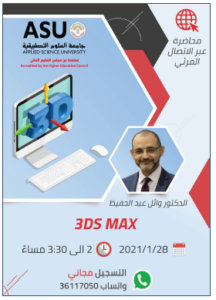
Delivering a Lecture Titled “Enforcement of Foreign Judgments in the Kingdom of Bahrain” to the Local Community
https://www.asu.edu.bh/wp-content/uploads/2023/05/CE-Booklet2020-2021.pdf
Dr Mohanad Alsenori, Associate Professor in Department of Private Law at the College of Law, delivered an online lecture titled “Implementation of Foreign Judgments in the Kingdom of Bahrain” on February 2nd, 2021, to the local community within ASU community engagement activities, the Training, Development and Continuing Education Centre and ASU Community Engagement. The lecturer discussed a number of topics during the lecture, including an introduction to the lecture topic, regulations for the enforcement of foreign judgments, conditions for enforcing foreign judgments in Bahraini law, and conclusions and recommendations. In addition to the local community, the lecture attendance included a number of academic and administrative staff, ASU students and alumni.
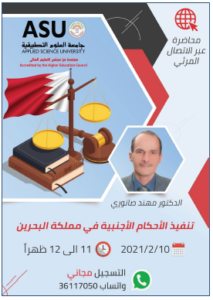
Delivering a Lecture Titled “Basics of Strategic Planning” to the Local Community
https://www.asu.edu.bh/wp-content/uploads/2023/05/CE-Booklet2020-2021.pdf
Professor Hatem Dammak, Head of the Audit and Compliance Unit at Applied Science University, delivered an online lecture titled “The Basics of Strategic Planning” on February 23rd, 2021, to the local community within ASU community engagement activities, the Training, Development and Continuing Education Centre and ASU Community Engagement Office. The lecture addressed various topics, including an introduction to strategic planning, the benefits of strategic planning, the strategic planning process, the analyses required before writing the strategic plan, its vision, mission, values, priorities, goals, performance indicators, and operational plans, publishing and updating. In addition to the local community, the lecture attendance included a number of academic and administrative staff, ASU students and alumni.
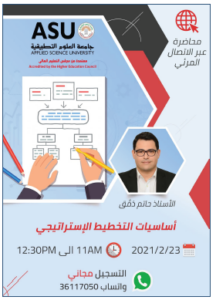
Delivering a Lecture Titled “How to Determine the Price of a Commodity in the Market” to the Local Community
https://www.asu.edu.bh/wp-content/uploads/2023/05/CE-Booklet2020-2021.pdf
Dr Ragab Ebrahim, Assistant Professor in Department of Accounting and Finance at the College of Administrative Sciences, delivered an online lecture titled “How to Determine the Price of a Commodity in the Market” on March 7th, 2021, to the local community within ASU community engagement activities, the Training, Development and Continuing Education Centre and ASU Community Engagement Office. The lecture addressed various topics, including the difference between the competitive market and the monopoly market, the demand curve for a commodity the supply curve for a commodity. He also clarified the equilibrium price definition. In addition to the local community, the lecture attendance included a number of academic and administrative staff, ASU students and alumni.
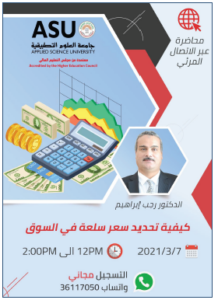
Delivering a Lecture Titled “Arabic Calligraphy and Its Reflections on our Contemporary Lives” to the Local Community
https://www.asu.edu.bh/wp-content/uploads/2023/05/CE-Booklet2020-2021.pdf
Dr Muhammad Al-Abbar, Assistant Professor in Department of Design and Arts at the College of Arts and Science, delivered an online lecture titled “Arabic Calligraphy and Its Reflections on our Contemporary Lives” on April 15th, 2021, to the local community within ASU community engagement activities, the Training, Development and Continuing Education Centre and ASU Community Engagement Office. The lecturer shed light on a number of topics during the lecture, including the history and development of Arabic calligraphy, Kufic fonts and their various aesthetic styles, soft and attributed calligraphy, types of Arabic calligraphy, the art of Arabic calligraphy and its lovers, Arabic calligraphy in printing, and modern Arabic fonts as communication arts. In addition to the local community, the lecture attendance included a number of academic and administrative staff, ASU students and alumni.
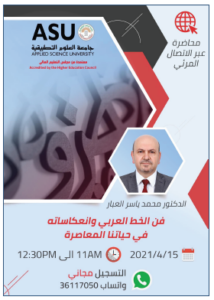
Delivering a Lecture Titled “How to Calculate Tax” to the Local Community
https://www.asu.edu.bh/wp-content/uploads/2023/05/CE-Booklet2020-2021.pdf
Dr Talal Al Alkawi, Associate Professor in Department of Accounting and Finance at the College of Administrative Sciences, delivered an online lecture titled “How to Calculate Tax” on April 28th, 2021, to the local community within ASU community engagement activities, the Training, Development and Continuing Education Centre and ASU Community Engagement Office. During the lecture, the lecturer clarified a number of topics, including the tax definition, its characteristics and objectives, the difference between “tax”, “fee”, and “fine”, types of taxes, standards of a good tax system, tax estimation methods, tax rates and methods of collection, classifications of taxpayers, determining taxable income, sales taxes and ValueAdded Tax (VAT), the application of VAT in Gulf Cooperation Countries (GCC), tax rates and how to handle them, VAT registration, the mechanism for calculating VAT, an application case for VAT and preparation of tax return form. In addition to the local community, the lecture attendance included a number of academic and administrative staff, ASU students and alumni.
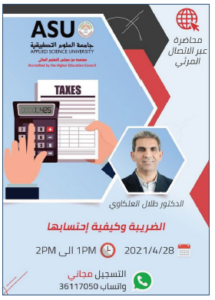
Delivering a Lecture Titled “Hygiene in the Concept of Islamic Civilisation” to the Local Community
https://www.asu.edu.bh/wp-content/uploads/2023/05/CE-Booklet2020-2021.pdf
Prof Murad Aljanabi, Professor in Department of Public Law at the College of Law, delivered an online lecture titled “Hygiene in the Concept of Islamic Civilisation” on May 25th, 2021, to the local community within ASU community engagement activities, the Training, Development and Continuing Education Centre and ASU Community Engagement Office. The lecturer clarified the significance of hygiene in building the Islamic civilisation, the civilisation of faith, science and charity. The lecturer discussed a number of topics during the lecture, including personal hygiene, hygiene at work, how to have a clean and pure heart, and a summary that includes the correlation of the equation in the three main themes and the emergence of the most beautiful and best-civilised models in the history of Islam. In addition to the local community, the lecture attendance included a number of academic and administrative staff, ASU students and alumni.
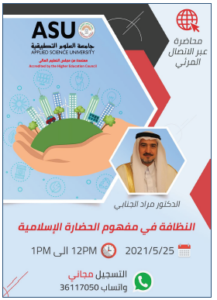
Delivering a Lecture Titled “E-Learning – Concept and Strategies” to the Local Community
https://www.asu.edu.bh/wp-content/uploads/2023/05/CE-Booklet2020-2021.pdf
Dr Ali El-Dada, Head of the Political Science Department at the College of Administrative Sciences, delivered an online lecture titled “E-Learning – Concept and Strategies” on May 27th, 2021, to the local community within ASU community engagement activities, the Training, Development and Continuing Education Centre and ASU Community Engagement Office. The lecture addressed various topics, including the e-learning concept, features, tools, and challenges, and face-to-face learning. In addition to the local community, the lecture attendance included a number of academic and administrative staff, ASU students and alumni.

Delivering a Lecture Titled “Management of Procurement and Tender” to the Secretary General of the House of Representatives
https://www.asu.edu.bh/wp-content/uploads/2023/05/CE-Booklet2020-2021.pdf
Dr Marwan Abdeldayem, Associate Professor in Department of Business Administration at the College of Administrative Sciences, delivered an online lecture titled “Management of Procurement and Tender” on October 8th, 2020, to the employee of the Secretary General of the House of Representatives within the framework of cooperation between the University and the Secretary General of the House of Representatives, the Parliamentary Studies and Training Centre, in collaboration with ASU Community Engagement Office. The lecturer provided adequate data about the definition of the purchasing function, the significance of the purchasing function, the purchasing objectives, and the quality of purchases. He also clarified the types of procurement, purchase cost, sources of data, sources and policies of supply, and comparison between sources of supply, in addition to the methods of evaluating the sources of supply, government procurement procedures, and analysis and bids evaluation.

Delivering a Lecture Titled “Principles of Administrative Investigation” to the Secretary General of the House of Representatives
https://www.asu.edu.bh/wp-content/uploads/2023/05/CE-Booklet2020-2021.pdf
Dr Ayman Hammouri, Assistant Professor in Department of Public Law at the College of Law, delivered an online lecture titled “Principles of Administrative Investigation” on October 13th, 2020, to the employees of the Secretary General of the House of Representatives within the framework of cooperation between the University and the Secretary General of the House of Representatives, the Centre for Parliamentary Studies and Training, in collaboration with ASU Community Engagement Office. The lecturer clarified that the public job represents a mandate for those in charge before they are entitled to it. Therefore, the purpose of doing it is to manage the public utility regularly and steadily, serving individuals and satisfying their needs. Consequently, the employee shall commit to a set of job duties, relevant laws and regulations, legitimate orders, and instructions based on the relationship between the public employee and his management, which has been settled by legal jurisprudence as an organisational relationship governed by legal rules in the country. Thus, the employee must adhere to these legal rules as an inevitable result of this relationship. Otherwise, he will be subject to disciplinary sanctions by the competent authority. The lecturer highlighted the significance of the investigation by showing administrative violations and revealing the facts as part of a set of procedures carried out by the competent investigative authority and thus the ruling, either acquittal or conviction, per the guarantees that constitutions and functional legislation have worked to create. The lecture dealt with the following topics: the definition of the public employee, the public employee’s duties, the meaning of the administrative investigation and its elements, the significance of the administrative investigation for the administration and the employee, referral to the investigation, investigation guarantees, and disciplinary sanctions.

Delivering a Lecture Titled “Analysis and Interpretation of Legal Texts” to the Secretary General of the House of Representatives
https://www.asu.edu.bh/wp-content/uploads/2023/05/CE-Booklet2020-2021.pdf
Dr Mohammad Alkhamaiseh, Assistant Professor in Department of Private Law at the College of Law, delivered an online lecture titled “Analysis and Interpretation of Legal Texts” on October 15th, 2020, to the employees of the Secretary General of the House of Representatives within the framework of cooperation between the University and the Secretary General of the House of Representatives, the Parliamentary Studies and Training Centre, in collaboration with ASU Community Engagement Office. The lecturer discussed that the judge’s role is to apply interpreted legal rules to judicial disputes to apply those rules properly. The interpretation is either a legislative interpretation undertaken by the legislator or a jurisprudent taken over by legal jurisprudence when conducting legal research and studies or a judicial interpretation, which the judge undertakes while applying the laws to the pending disputes. The legal texts analysis deconstructs the legal text into the elements and then identifies its components. The interpretation and analysis of legal texts are significant for those working in the law, such as University professors, judges, lawyers, and law students, or for people performing a specific legal act. The lecture was divided into two main themes, the first is the interpretation of legal texts, and the second is the analysis of legal texts.

Delivering a Lecture Titled “The Art of Decision-Making and Solving Administrative Problems” to the Secretary General of the House of Representatives
https://www.asu.edu.bh/wp-content/uploads/2023/05/CE-Booklet2020-2021.pdf
Dr Atheelah Alazawi, Assistant Professor in Department of Business Administration at the College of Administrative Sciences, delivered an online lecture titled “The Art of Decision-Making and Solving Administrative Problems” on October 21th, 2020, to the employees of the Secretary General of the House of Representatives within the framework of cooperation between the University and the Secretary General of the House of Representatives, the Parliamentary Studies and Training Centre, in collaboration with ASU Community Engagement Office. The lecture highlighted the quantitative methods in analysing administrative and economic problems and searching for optimal solutions as a step towards substituting scientific logic and reaching an objective decision. The quantitative method in decision-making depends on using mathematical and statistical methods, operations research and computer techniques, away from intuition and personal guesswork. The quantitative approach is a logical framework for analysing complex decision-making problems and reaching a better decision. The lecture addressed various topics, including the administrative decision-making concept, its stages, data, and types. The lecturer also clarified the role of the manager, data, and quantitative in decision-making methods and the role of decision theory applications and break-even analysis in the decision-making procedure.

Delivering a Lecture Titled “Developing Accounting and Financial Performance” to the Secretary General of the House of Representatives
https://www.asu.edu.bh/wp-content/uploads/2023/05/CE-Booklet2020-2021.pdf
Dr Ammar Alsammarraee, Assistant Professor in Department of Accounting and Finance at the College of Administrative Sciences, delivered an online lecture titled “Developing Accounting and Financial Performance” on October 25th, 2020, to the employees of the Secretary General of the House of Representatives within the framework of cooperation between the University and the Secretary General of the House of Representatives, the Parliamentary Studies and Training Centre, in collaboration with ASU Community Engagement Office.

Delivering a Lecture Titled “Writing Legal Memos” to the Secretary General of the Council of Representatives
https://www.asu.edu.bh/wp-content/uploads/2023/05/CE-Booklet2020-2021.pdf
Dr Murad Altarawneh, Assistant Professor in Department of Private Law at the College of Law, delivered an online lecture titled “Writing Legal Memos” on October 26th, 2020, to the employees of the Secretary General of the Council of Representatives within the framework of cooperation between the University and the Secretary General of the Council of Representatives, the Parliamentary Studies and Training Centre, in collaboration with ASU Community Engagement Office. The lecturer suggested following a scientific approach when writing legal memoranda or a topic. If the legal person lacks the preparation approach of his legal memorandum, his explanations will sound chaotic. The scientific method in drafting legal memoranda is a technical methodological method for transferring knowledge to others; it differs from ordinary thinking. It depends on a specific approach to examining the subject matter and the relationship between the facts and evidence, reference, and records. It also depends on interpretation and analysis, objectives, and logical conclusions. The lecture addressed various topics, including preparing legal regulations (the list of cases and portfolio documents), the legal responses to the regulations, the pleadings close, and the jurisdiction.

Delivering a Lecture Titled “Legal Research Work” to the Secretary General of the Council of Representatives
https://www.asu.edu.bh/wp-content/uploads/2023/05/CE-Booklet2020-2021.pdf
Prof Ghaith Al Khassawneh, Acting Head of the Legal Clinic Unit and Associate Professor at the College of Law, delivered an online lecture titled “Legal Research Work” on November 1st, 2020, to the employees of the Secretary General of the Council of Representatives within the framework of cooperation between the University and the Secretary General of the Council of Representatives, the Parliamentary Studies and Training Centre, in collaboration with ASU Community Engagement Office. The lecturer clarified that preparing legal research is necessary for professors, judges, lawyers, consultants, students and other practitioners. He also mentioned that writing research enriches the researcher’s linguistic talent of legal methodological thinking, showing the advantages and disadvantages of legal texts. Legal research provides libraries with research related to all law branches. The lecture addressed choosing a research topic, collecting sources and references, and legal writing.

Delivering a Lecture Titled “Tools for Political and Social Analysis” to the Secretary General of the Council of Representatives
https://www.asu.edu.bh/wp-content/uploads/2023/05/CE-Booklet2020-2021.pdf
Dr Ali Aldada, Head of the Political Science Department at the College of Administrative Sciences, delivered an online lecture titled “Tools for Political and Social Analysis” on November 5th, 2020, to the employees of the Secretary General of the Council of Representatives within the framework of cooperation between the University and the Secretary General of the Council of Representatives, the Parliamentary Studies and Training Centre, in collaboration with ASU Community Engagement Office. The lecturer clarified that analysis is an old concept, which subsequently underwent many developments, as the analysis relied basically in the past on asking questions and trying to find answers to identify the reasons behind the occurrence of a phenomenon. However, the rapid events prompted the development of analysis tools in various fields. The lecture highlighted the political and social fields, analysed cases and the study manner of the relationship between the fragments, and their impact has been identified. The lecture addressed various topics, including nature analysis, its methodology, origins, necessity and significance, and the benefits of political and social analysis, their methods, and tools.

Delivering a Lecture Titled “Final Accounts and Financial Analysis” to the Employees of the Secretary General of the Council of Representatives
https://www.asu.edu.bh/wp-content/uploads/2023/05/CE-Booklet2020-2021.pdf
Dr Iyad Al Sartawi, Head of the Accounting and Finance Department at the College of Administrative Sciences, delivered an online lecture titled “Final Accounts and Financial Analysis” on November 9th, 2020, to the employees of the Secretary General of the Council of Representatives within the framework of cooperation between the University and the Secretary General of the Council of Representatives, the Parliamentary Studies and Training Centre, in collaboration with ASU Community Engagement Office.
The lecturer presented an idea of preparing accounts, final accounts and financial statements for government projects, and various topics that included preparing accounting settlements according to the accrual basis, preparing financial and performance reports, and reading and analysing financial statements and final accounts.

Delivering a Lecture Titled “The Optimal Use of Social Media Platforms” to the Employees of the Secretary General of the Council of Representatives
https://www.asu.edu.bh/wp-content/uploads/2023/05/CE-Booklet2020-2021.pdf
Dr Mohammad Alaa Al-Hamami, Associate Professor in Department of Management Information Systems at the College of Administrative Sciences and Manager of Community Engagement Office, delivered an online lecture titled “The Optimal Use of Social Media Platforms” on November 18, 2020, to the employees of the Secretary General of the Council of Representatives within the framework of cooperation between the University and the Secretary General of the Council of Representatives, the Parliamentary Studies and Training Centre, in collaboration with ASU Community Engagement Office. The lecturer shed light on the significance of the various social media platforms and how to create accounts and use them correctly and optimally to achieve the various goals and objectives. The lecturer also clarified the ethics of social media, the risks of social media, and how to manage those risks. The lecture also addressed a number of topics, including facts about social media, social media platforms and their types, the stages (life cycle) of a social media account, the ethics of social communication, the danger of social media, safety tips for social networking, and tips on how to protect yourself against cybercrime.

Delivered a Lecture Titled “Time Management and Setting Priorities” to the Employees of the Secretary General of the Council of Representatives
https://www.asu.edu.bh/wp-content/uploads/2023/05/CE-Booklet2020-2021.pdf
Dr Khairi Omar, Head of Department of Business Administration at the College of Administrative Sciences, delivered an online lecture titled “Time Management and Prioritisation” to the employees of the Secretary General of the Council of Representatives on Sunday, November 22 2020, within the framework of cooperation between the University and the Secretary General of the Council of Representatives, the Parliamentary Studies and Training Centre, in collaboration with ASU Community Engagement Office. The lecturer highlighted time management, whether at work or on their own time. Some individuals can work continuously for long hours without achieving satisfactory results and vice versa. It depends on time management and prioritisation, effective time management, prioritisation and goal-setting. This lecture is designed to provide participants with the essential techniques and skills to identify the significant factors contributing to performance improvement and increasing productivity based on the latest practical, scientific and psychological research on this topic. The lecture addressed various topics, including managing time, prioritising and linking time to your short and long-term goals, utilising the planning and scheduling techniques, using the 4 Ds for effective workflow, and setting smart goals. The lecture also included how to stop wasting time and procrastination, manage your environment, manage the flow of emails and phone calls, align priorities with expectations, and learn the art of effective delegation.
How to Use Excel for Activity and Business Preparation.
https://www.facebook.com/photo/?fbid=288350803585895&set=pcb.288350893585886
As part of the initiatives of the University of Applied Sciences for community partnership and service, the university hosted a training lecture in its laboratories titled “How to Use Excel for Activity and Business Preparation.” The lecture was organized by the Department of Quran Affairs at the Ministry of Justice, Islamic Affairs, and Endowments, in collaboration with the Community Service Office at the University of Applied Sciences. It was delivered by Dr. Ahmed Saleh Shatat, Head of the Department of Management Information Systems at the College of Administrative Sciences. The lecture took place on Monday, June 19, 2023, and was attended by female coordinators of Quranic activities from Quran education centers.
At the beginning of the lecture, Dr. Mohammed Al-Hamami, the Director of the Community Service Office, welcomed the esteemed guests. Following that, Mr. Bahaa Krayem, the Director of the Public Relations Office, gave a presentation about the university’s achievements, programs, and scholarships.
